#positioner
Explore tagged Tumblr posts
Text
positionality vs identity
making this post in response to circulating claims about "transmasc privilege" and a noticeable gap in some of y'alls understanding of oppression.
positionality can be thought of as the way society perceives and treats you, and what privileges you are afforded accordingly.
identity can be thought of as your internal sense of self.
for most people, the two do not line up perfectly. your positionality depends on what people immediately see, not what you tell them. your positionality may also vary day to day based on a number of factors including but not limited to the people you are surrounded by, the space you are in, and the positionalities and identities of those perceiving you.
privilege is based almost entirely on positionality, not identity.
a good example is the diversity within the transgender community. if you take three transgender men at different stages in their transition they will each have a different positionality. one may have the positionality of a gender conforming cisgender man, the second may have the positionality of a transgender man, the third may have the positionality of a gender conforming cisgender woman. the gendered privileges these three people are afforded are vastly different despite all three of them having an identical gender identity.
if you have the positionality of a certain marginalized group, you will be targeted with the same oppression as them whether or not you share an identity with them. the fact that you don't share the identity doesn't suddenly make that oppression go away. you can be oppressed based on a positionality that does not align with your identity.
if you have questions on positionality vs identity i urge you to reply to this post instead of ignoring the gap in your knowledge.
#positionality#identity#positionality vs identity#trans#trans community#transmasc privilege#transfem#transgender#discourse mention#important#oppression#activism#transandrophobia
848 notes
·
View notes
Note
hey um. u sure make a lot of art about lesbians for a man. you're normal about us, right? ;;
What? Yeah, I’m normal about y’all.
#I understand the suspicion and where you’re coming from I really do but strange thing to ask an artist tbh#ill say this. I try to be cognizant of my positionality as a queer man who enjoys sapphic ships and am constantly checking myself to make#sure my art doesn’t go into territories I don’t feel comfortable with. thereve been times I’ve second guessed myself while drawing rarijack#and thought “Is this too much?’’ and I have to check with my partner who is sapphic.#but also I’m a queer artist who likes drawing queer love. if my content makes you uncomfortable I’d be happy to start a dialogue about it#but there’s a reason why I’ve not drawn women kissing or being explicitly intimate.#anyways my art and thoughts about gay men are not so normal because I like cock so do what you will with that info#ask me#anon
270 notes
·
View notes
Text
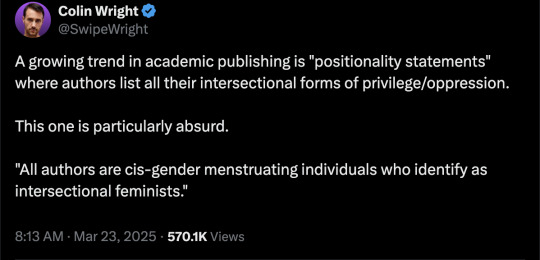

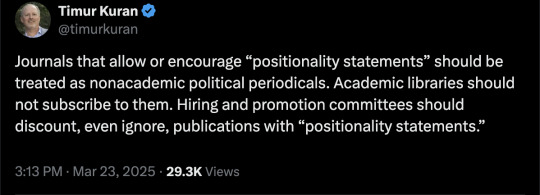
==
Literally a manifestation of the Genetic Fallacy.


"Positionality Statements," like pronouns-in-bio, are not completely useless. They're red flags offered up willingly that tell you someone is not to be trusted or should be ignored.
🚩🚩🚩
#Colin Wright#Timur Kuran#Genetic Fallacy#positionality statement#positionality#intersectionality#intersectional feminism#feminism#pronouns in bio#red flags#religion is a mental illness
29 notes
·
View notes
Text
the thing is I think the political under/overtones of the hunger games and catching fire are actually pretty good and well-developed. and then you hit mockingjay and that all goes out the window.
#tbosas's politics is very good. best developed line out of the four tbh#I haven't read sotr so I can't speak for that one#the hunger games#bc its trending?? I guess??#pigeon.txt#but yeah the political conclusions of mockingjay specifically piss me the fuck off a little bit#its where you can most clearly see sc's “white daughter of a vet peace advocate” positionality
21 notes
·
View notes
Text
What I find dynamically interesting about Armand is he really is a victim of his own privileges, but his privileges are still privileges, and it kind of gets lost where exactly he stands in position to them. With Marius it's most clear, like he gets luxuries, money, an education but those don't cancel out how he was abused and prostituted by Marius. In the CoD, yes he is the leader, but he's a victim of being forced into the position against his will, having to take on, and become accustomed to, the role of killing other vampires who break The Great Laws, regardless of his own desire to, and further, having to uphold things he no longer believes in, in order to appease the larger group.
With the TdV the only main difference is that it's secular. He has control over the beliefs being presented, giving humans/the audience the illusion and vampires the grim reality of things. So he can now think for himself, but still has to appease a larger group he never wanted, who are labyrinthine depths of stuff he wishes he didn't have to put up with. He upholds the laws pretty much only in order to appease people, and to some extent reinforce his role as the leader. Keeping this order and peace isn't what he wants though, he doesn't want his leadership. But I think a part of him is aware how such a position can become abused, and can suspect how someone like Santiago would abuse the position. The Great Laws almost need someone who doesn't want to be the one to uphold them in order to not be abused.
And I think as well that this secularism puts him at greater risk, (greater perceived risk I should say?), since people aren't considering some kind of divine right to his ruling. He has to actually prove he deserves this position, and is strong enough to maintain it. The theatre was also established right around the time of the french revolution, where uncontested 'divine' leadership was toppled for enlightenment thinking. So he can garner the coven is disillusioned by how much power he really holds. He's probably rightfully paranoid. I think as well he's understandably fairly unaware of his true position in all of this, and how much power he actually holds, or could hold, especially given all of the various contentions he has with his own power.
The only part of things where he isn't a victim at all is with Louis, but I think he probably sees himself this way. (No Armand there's more to being a victim than simply not having your way). Like he has all the privilege of everything he ever wanted, but at a cost for something he never wanted - (The trail and Louis' tendency towards ideation and depression made worsened by said trail. Of which he partook in an unclear position of privilege. Though he tells it that he'd been forced to). He's still living a lie of himself, which I think is what fuels this sense of being partway the victim in all this. He still has to posture a role and appeasement towards his privileges in order to have a semblance of peace and what he wants. Though this is in a much more manageable and definitely desired way, he can be possessive over out of purely his own desire for it. But even if this is everything he wanted he's always going to be on edge with knowing it's all a lie that he conveniently earned Louis back. (If we're going with just the show there's something in the way the acting is done that says Armand was NOT expecting it, even upset.)
And he gets toppled out of this by Daniel, and for the first time has really no privileges at all, no position at all, but is completely free to simply be seen, and be himself. He wanted this in equal measure to wanting love. He wanted to be seen and heard, and to experience the world without being beholden to a lie of himself he'd developed to endure. I think he always feared this, and yet also desired this out of Daniel. He just couldn't fully admit it till he saw it. Daniel is the best thing to have ever happened to Armand, and I'm not sure how Armand is taking it. Probably with a lot of confusion, probably very lost. But he did change him, he is his fledgeling. So that must mean something, maybe something he can hold onto to maintain some type of thread to all he has ever been. Maybe for love for him, maybe a gift of reciprocity. It's speculation.
Also the fact Armand is not white in the TV adaptation adds many layers to his positionality. He is always going to be without the privileges of whiteness, even with a position to be granted some amnesty and privileges by appealing to whiteness. He is a victim as well of colonialist racism, first, before even ending up with Marius. Having then no privileges, not even that of himself.
#iwtv#interview with the vampire#amc iwtv#armand#iwtv spoilers#positionality is what was missing from this discussion and his position is increasingly unclear until it's just back to being very clear on#the opposite end of the spectrum#don't get this twisted though like Armand is ... very much an iron gauntlet with all the control if he actually wants to be. Though I think#really all he is is a bunch of traumatic responses to things rather than like... acting with thought to it.
32 notes
·
View notes
Text
literally it is not 2012. like yeah part of me is stuck in 2012 *gestures at blog* but why are some of you bullying people off the internet over opinions on a fictional character. like grow up, get a life, move on, make fandom just a pillar of the house of you (if it’s even that relevant to your identity and not less so), and recognize that some stranger’s thoughts on your fave character, while they may annoy you, are also so not that serious
#.txt#thg#obviously this is not directed towards this group bc you guys are remarkably chill and fun and cool but this is actually appalling and I#want to make my positionality on this VERY clear.#like this is akin to that anon who thought they like. knew me or something. based on my presence on the internet. and I’m like brother this#doesn’t even rank as a pillar of the house of me and the fact that some of you base your identity around this to the point where it becomes#aggressive when your worldview is threatened…like. that’s a problem!
7 notes
·
View notes
Note
everyone already sucking ya dick in the notes so to clarify it’s fine if you draw lesbian shit but if it’s the ONLY thing you draw and it’s the ONLY shit that makes you so popular and you’re literally only known for your lesbian art that’s weird man. “uuu we need more lesbian content uu” yeah from LESBIANS! lesbians in the notes stand up like why u want man-made lesbian content so bad. also put your pronouns somewhere dude it’s not hard
Alright, I agree. I should be doing more, so I'm gonna be expanding my art content.
#ask me#anon#i talked about doing more mlm art on twitter last month btw but not here#i wanna be considerate of my positionality as a creator regardless of whether people enjoy my content#that being said you're being an asshole too#there are more constructive ways of telling someone their content makes you uncomfortable#also my pronouns are in my pinned post they're right under my name
276 notes
·
View notes
Text
arguments around transandrophobia have taught me that way less people understand intersectionality than i thought
#like no men generally are not oppressed for being men however any intersection of marginalization impacts that#like if you think all men navigate the world w privilege you don’t understand how intersectional severely changes the positionality of a man
11 notes
·
View notes
Text
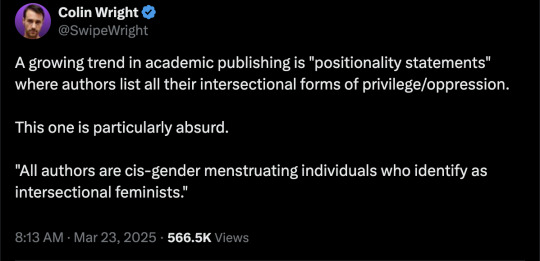

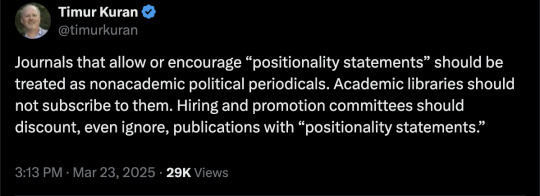
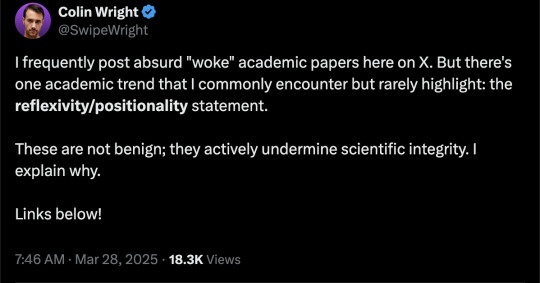
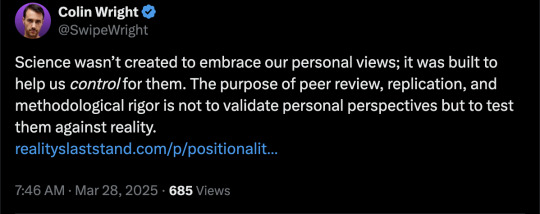
By: Colin Wright
Published: Mar 28, 2025
Some readers may know that I often post ridiculous, ideology-driven academic papers and dissertations on X (formerly Twitter). It’s become a bit of a hobby—calling out how certain fields have drifted into performative activism disguised as serious scholarship. Some of the worst examples turn into full-blown posts here on Reality’s Last Stand, where I break down not just what’s wrong with them, but why everyone should care. However, there’s one academic trend that I repeatedly encounter but rarely highlight, perhaps because it’s become so common it fades into the background: the “reflexivity” or “positionality” statement.
I recently posted an especially absurd example on X, where the authors felt the need to let readers and potential reviewers know that they were all “cis-gender menstruating individuals who identify as intersectional feminists,” among other things.
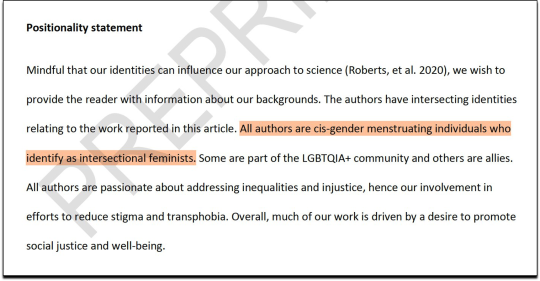
Although these statements are most commonly found in the usual “woke” or “grievance studies” disciplines—fields that openly reject traditional scientific norms and standards—they are now creeping into mainstream, even top-tier, science journals. What started as a practice mostly limited to qualitative research in the social sciences has now spread much more widely. Take this example from a paper published in Nature Ecology & Evolution:
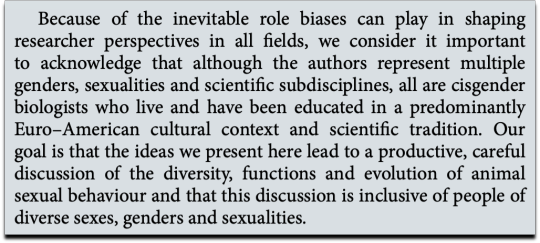
We should all certainly hope that the authors have been “educated in a predominantly Euro–American cultural context and scientific tradition,” given that the paper is published in a Europe-based science journal!
So what’s going on here? What exactly is a positionality statement, and why are researchers including them?
In short, a positionality (or reflexivity) statement is a formal acknowledgment by researchers of their own social identities—such as race, gender, class, sexuality, or other “lived experiences”—that may have shaped their perspective on the research topic. Think of it like a conflict-of-interest (COI) disclosure, except instead of revealing financial ties that might compromise a researcher’s objectivity, the author is confessing their social location and ideological commitments.
Supporters of this practice claim it promotes transparency. They say it’s just being honest: all people have biases, so why not acknowledge them up front? But the reasoning gets much more ideological than that. Their view isn’t just that people are shaped by their environment—which is obviously true—but that all knowledge is socially situated. This belief comes from a branch of feminist and postmodern philosophy known as “standpoint epistemology.” According to this view, people from marginalized groups enjoy a kind of “epistemic privilege”: because of their lived experiences, they are thought to have special access to certain truths, especially about oppression and injustice. However, this epistemic privilege has been extended to scientific truths as well. The fatal flaws in this philosophy will be made clear later on.
On the surface, positionality statements seem noble—who could be against reflection and transparency? But when you start looking at it more closely, many serious issues begin to surface.
The most thorough critique of positionality statements I’ve seen comes from a paper titled “Positionality and Its Problems: Questioning the Value of Reflexivity Statements in Research” by Jukka Savolainen, Patrick J. Casey, Justin P. McBrayer, and Patricia Nayna Schwerdtle, published in Perspectives on Psychological Science. In it, the authors lay out three major objections to the practice, each of which should give serious pause to anyone who believes science should be guided by evidence and logic instead of ideology.
Positionality Statements Are Fundamentally Flawed
The first objection is philosophical: positionality statements are inherently self-defeating. They attempt to disclose how a researcher’s identity may shape their perspective on a topic, but the very epistemology that justifies positionality statements—standpoint theory—also undermines the credibility of any such self-disclosure.
As Savolainen et al. point out, reflexivity statements are “constrained by the very positionality they seek to express.” The idea here is almost paradoxical: if your identity shapes and distorts your view of the world—including your ability to reflect on yourself—then your positionality statement is just as distorted as your research. “Like a scale that tries to weigh itself,” they write, “constructing a credible positionality statement is ultimately an impossible task.” If you genuinely believe that your social location biases everything you do, then the positionality statement you construct to describe that bias is already infected by the same problem.
Advocates of positionality statements might respond: Sure, nobody is perfectly objective, but researchers can still identify some facts about themselves—like race, sex, class, or gender identity—that provide readers with useful context. The authors acknowledge this objection. Yes, it is “quite easy for scholars to accurately report their biological sex, their gender identity, nationality, race/ethnicity, and many other personal characteristics.” These are, to some extent, knowable and reportable.
But as the authors rightfully highlight, those things are often the least relevant to the scientific content of a study: “We take issue with the assumption that these kinds of attributes—the listing of which dominates positionality statements—are particularly salient for any given study.” Just because a researcher is white or black, rich or poor, or “cis” or “trans,” doesn’t automatically mean those characteristics shaped the research process or interpretation in any meaningful way. And if they did, simply reporting them does not magically make that bias evaporate.
To drive the point home, the authors analyze a published positionality statement (below) by Elliott and Reid (2019), where two white women reflect on the “dangers” of writing about low-income black Americans.
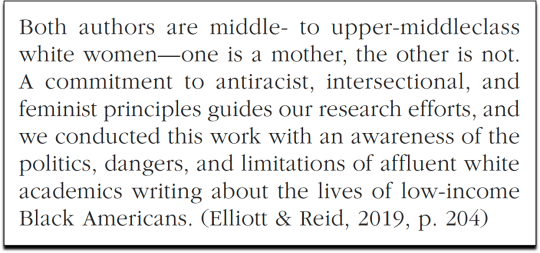
The authors of this statement claim to be guided by “anti-racist, intersectional, and feminist principles” as a way of signaling their political virtue and awareness. But as Savolainen and his colleagues point out, why focus only on those traits? Why not mention other potentially relevant parts of their identity, like their religion, education, or personality? As the authors ask, “Why did the authors reflect on the ‘dangers’ of racial and class dynamics but seemed unbothered by their strongly expressed political commitments?”
Their point is that these statements often highlight only the identity traits that are currently popular or politically favored, while ignoring others that might matter just as much. This selective framing undermines the supposedly honest and reflective nature of the exercise, turning it into a performance, perhaps often crafted to align with disciplinary norms or to curry favor with reviewers and editors.
This leads to a tough but fair question: “Should the research community trust the authors themselves to decide which aspects of their lives need to be disclosed to people who read their research contributions? We think the answer is ‘no.’”
And this isn’t just a problem with one paper—it’s a problem with the entire practice. Positionality statements claim to reduce bias, but in reality they often just amplify the author’s subjectivity under the illusion of self-awareness.
The authors sum it up:
Our point is to illustrate the challenges involved in crafting a positionality statement of any kind. These kinds of statements are unpersuasive because academic scholars cannot have it both ways. They cannot, on the one hand, claim to be burdened by their biography when conducting the research, yet, on the other hand, be emancipated from it while constructing a positionality statement. Fortunately, as we demonstrate next, this inescapable dilemma is not something that needs to be solved.
Positionality Statements Misdiagnose the Source of Scientific Bias
The second problem is that positionality statements focus on the wrong kind of bias. Bias in science does not primarily originate from individual characteristics—your race, gender, politics, or upbringing—but from a failure of the process by which knowledge is created, tested, and refined. Scientific bias is not reduced or eliminated by announcing your identity; it is reduced by rigorous methodology, peer review, replication, and being open to criticism.
As Savolainen and colleagues put it, “Positionality statements are beside the point: By focusing on the characteristics of participating scholars, these kinds of declarations miss the true sources of research bias—the field’s collective failure to adhere to the scientific ethos.” Science doesn’t work because scientists are unbiased—they aren’t. It works because the system is designed to push everyone’s ideas through a rigorous, competitive process that filters out error over time.
Ironically, by putting the spotlight on personal identity instead of scientific methods, positionality statements may actually increase bias. Instead of focusing on methods, data quality, and replicability, we are asked to judge research in part based on the author’s race, gender, or ideological alignment. That’s not objectivity—it’s just replacing one kind of bias with another.
Positionality Statements Undermine the Norms That Protect Science
Finally, and perhaps most dangerously, positionality statements erode the very norms that make science trustworthy in the first place—especially the principle of universalism. This is the idea that scientific claims should be judged by the strength of the evidence, not by who is making the claim. What matters is the quality of your data and reasoning, not your identity.
But when journals start asking (or requiring) researchers to include positionality statements, they flip that principle on its head. Instead of suppressing identity cues through double-blind peer review, we now ask authors to foreground them. That opens the door to identity-based favoritism, virtue signaling, and even manipulation. Authors may exaggerate or fabricate aspects of their biography if they believe it will help them get published. And let’s be honest: positionality statements are only encouraged in one direction. Progressive researchers are encouraged to share their “marginalized” identities or activist goals. No one is asking conservative, religious, or apolitical scholars to declare their “lived experiences” or ideological frameworks—unless to apologize for them.
As Savolainen and co-authors put it, positionality statements have become “a way for authors to signal their adherence to the ideological mainstream of a discipline.” It’s less about being transparent and more about proving you’re on the “right side.” Often, these statements read like a shield: “We are good and right-thinking researchers—please don’t peer-review us too hard.”
This gets to a deeper and more cynical interpretation of the trend. As I’ve often pointed out, there’s a growing body of academic work that looks more like propaganda in the language of scholarship. Positionality statements are part of that performance. Yes, it's true that personal identity and politics can influence research. But the idea that simply declaring your bias somehow cancels it out is ridiculous. In practice, it often does the opposite—it gives researchers permission to lean even harder into their bias while pretending to have neutralized it.
We all have biases—that's just part of being human. But science wasn’t created to embrace our personal views; it was built to help us control for them. The purpose of peer review, replication, and methodological rigor is not to validate personal perspectives but to test them against reality.
If we want a more inclusive, robust, and representative science, we should be pushing for better methods, open data, and viewpoint diversity—not more identity-based posturing. As Savolainen and colleagues argue, “the most productive path to increasing representation and reducing positional bias in research is to protect the freedom of scholarly inputs while insisting on methodological transparency and rigor.”
Science doesn’t need more confessionals. It needs more rigor.
==
This is the endorsement of the Genetic Fallacy as a moral imperative.


Xians tell me that I'm disqualified from criticizing Xianity because I'm not a Xian. Muslims tell me that what I have to say about the quran is irrelevant.
Except, neither of those things are true.
If you're giving "positionality statements," you're not doing science.
#Colin Wright#genetic fallacy#intersectionality#positionality#positionality statement#science#academic corruption#propaganda#bias#scientific bias#religion is a mental illness
10 notes
·
View notes
Text
does anyone know where i might find a post about how post-apocalyptic scavenging stories, specifically noting the last of us and the walking dead, are fundamentally reflective of a fear of homelessness. i know i saw one when the tlou series was first releasing but i cannot for the life of me think of where to find it
#talkyllama#the last of us#the walking dead#tlou#tlou hbo#it's for school jsdfhj we're analyzing emplacement and positionality wrt imagination of the future#and reading octavia butler's parable of the sower which i think gives a really interestingly different point of view from other such storie#where society collapses entirely#because stores still function and you still have to spend money to buy things there. in that dystopia. which is not the case in these other#other stories#which is why i think parable of the sower may have a more compelling and more realistic depiction of homelessness as an issue of enduring a#an apocalypse. cus what do you do when it's just YOUR society that has collapsed? and the rest of civilization (ie grocery stores etc) are#still functioning and still expecting you to function as if the social contract still stands#so. if anyone could point me toward this post im thinking of thatd be gorgeous lmao
18 notes
·
View notes
Text
keep trying write brief intro summary about life because drastic decline of health stuff because keep being paranoid about not-so-kind & conservative & ableist people who knew me before that all happened finding me now and thinking am faking all of it
and keep failing!!! on how many draft now n been working on it for past year or maybe even more!!!! communication disability strikes again (it strikes every day)
#know technically don’t owe anyone life story but. OCD#also. own lived experience & positionality affect activism & where am speaking from so important understand#my life reallyyyyyyy complex & so many factors hard keep it short without leave out detail but without putting out too much info to stranger#whole internet safety drill thing#drill works in way that. well. am aware need limit what say on internet to be safe. but not work in way that am not mentally flexible &#not able generalize enough for drill to have practical meaning#🍞.txt
34 notes
·
View notes
Text
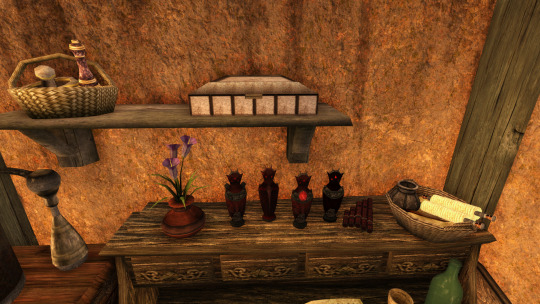
Starting a Sixth House Trinkets collection in my house
#actually sort of regretting getting a pre-decorated player home mod instead of one with empty shelves I can decorate myself#morrowind#tes3#elder scrolls#path of the incarnate#tiger plays video games#I always HATED manually decorating houses in skyrim and over the years gravitated more towards houses full of locked clutter#I did my times in the jaxonz positioner mines and never really felt the desire to go back#but idk not only does this modlist have a grabber mod but console positioning in morrowind is REALLY EASY so it's not that bad
3 notes
·
View notes
Text
truly nothing on this earth is more foul than supernatural familial abuse discourse but specifically the discourse people have about if sam or dean "had it worse" like ok cool you have already missed the point of this show very hard.
#the things ive seen in those trenches.....#its like actually their circumstances were based on their positionality in the family and the expectations each had#but on another level the discourse never truly explores what sams life was like as a child. hes either a spoiled brat or a martyr#in ways that make him one dimensional in ways fanon child dean just. isnt.#sam isnt just isolated. hes also controlled and surveilled. any wrong move (unbeknownst to him) proves to john hes irredeemable#like the center of john telling dean he might have to kill sam. is always dean like i feel crazy with how little consideration there is#toward the mental headspace of a guy whose whole childhood is suddenly warped by the realization his father suspected he was evil#and might need to be put down like a dog. and then. sam accepts this!!!! he truly believes is he Crosses A Line dictated by deans judgement#then oops oh well! because fundamentally sam has been conditioned to believe in his own inability to make decisions about himself#so the 'dean protects sam! dean keeps sam innocent and gave him a childhood' becomes much more insidious when u realize#that is one side of the coin wherein sam is under the complete authority of another person#and obv dean is not evil for that. its learned behavior!!#but instead of teasing out this reality when we learn what john told dean... it becomes aww poor dean :(( instead of a horrific glimpse int#the hierarchy of information and control fundamental to their relationship. guys its a cult.#my posts#spn
56 notes
·
View notes
Text
There'll probably be a spasm of paranoiac activity where I am overwhelmed by my need to self-justify but then it will be normal and I will just post gay people kiss again or whatever.
#i don't have a license though for my drawing program of preference so that may alter things. but like idk i will try to be free. and earnest#and let my earnestness speak for itself and exhibit itself as positionality-conscious instead of needing to hedge everything forever#text#mine#puts my head between my knees#this is just who haze is now ahahaha
2 notes
·
View notes
Text
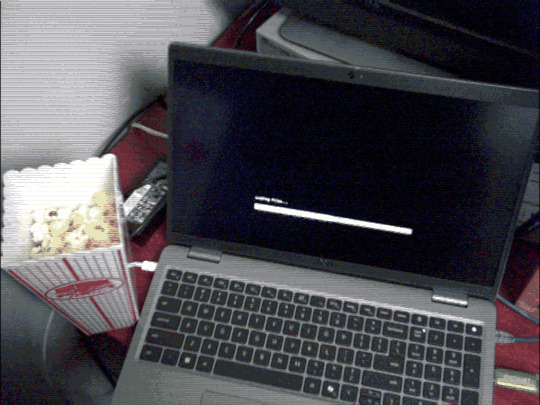
#photography#palmpix#palm IIIc#at this point the number of steps to do smth like this is getting ridiculous.#scale to 1920x1440 cubic interpolation#make a second working copy called copy b#on copy b up brightness and contrast#convert to indexed colour generating a 36 colour palette from that usin floyd-steinberg dithering#reconvert to srgb#reconvert to indexed with 24 colours with floyd-steinberg dithering#reconvert to srgb... again#and then back into the indexer to get our distilled 12 colours. create palette from that and discard working image#then set threshold map to my scanlines and force it to positionally dither my upscaled image into our nicely processed 12 colour palette#anyways. I say generating a colour palette - I'm still waiting to find out if the GNU image manipulation program uses k-means clustering or#what lol#wanna fuck around and see what kinds of palettes k-medoid can yield!!!#anyway. my ride is almost here
2 notes
·
View notes
Text

starting to think you guys don't know what a dead wife is
#a dead wife isn't just someone you miss lol it's about the gendered lack of agency & positionality within the narrative. but ok sure#severance#page 197 slaps
7 notes
·
View notes